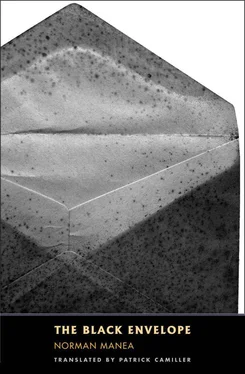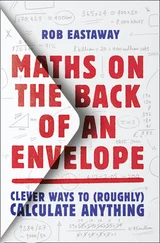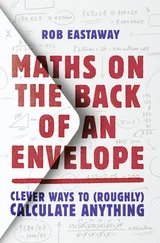Norman Manea - The Black Envelope
Здесь есть возможность читать онлайн «Norman Manea - The Black Envelope» весь текст электронной книги совершенно бесплатно (целиком полную версию без сокращений). В некоторых случаях можно слушать аудио, скачать через торрент в формате fb2 и присутствует краткое содержание. Год выпуска: 2012, Издательство: Yale University Press, Жанр: Современная проза, на английском языке. Описание произведения, (предисловие) а так же отзывы посетителей доступны на портале библиотеки ЛибКат.
- Название:The Black Envelope
- Автор:
- Издательство:Yale University Press
- Жанр:
- Год:2012
- ISBN:нет данных
- Рейтинг книги:5 / 5. Голосов: 1
-
Избранное:Добавить в избранное
- Отзывы:
-
Ваша оценка:
- 100
- 1
- 2
- 3
- 4
- 5
The Black Envelope: краткое содержание, описание и аннотация
Предлагаем к чтению аннотацию, описание, краткое содержание или предисловие (зависит от того, что написал сам автор книги «The Black Envelope»). Если вы не нашли необходимую информацию о книге — напишите в комментариях, мы постараемся отыскать её.
"Reading 'The Black Envelope,' one might think of the poisonous 'black milk' of Celan's 'Death Fugue' or the claustrophobic air of mounting terror in Mr. Appelfeld's 'Badenheim 1939'... Mr. Manea offers striking images and insights into the recent experience of Eastern Europe." —
The Black Envelope — читать онлайн бесплатно полную книгу (весь текст) целиком
Ниже представлен текст книги, разбитый по страницам. Система сохранения места последней прочитанной страницы, позволяет с удобством читать онлайн бесплатно книгу «The Black Envelope», без необходимости каждый раз заново искать на чём Вы остановились. Поставьте закладку, и сможете в любой момент перейти на страницу, на которой закончили чтение.
Интервал:
Закладка:
His wife communicated her existence in a quite unconventional manner. Dominic picked it up in the long fizzling of the curtains, the buzzing of a fly newly stirred, the shiver of a sudden breeze — they all seemed to lay bare her indistinct breathing in every corner, from where a stimulus or subterfuge warning would issue cyclically, like a heavy blinking of the eyelashes of nothingness … Perhaps indeed, on that sunny Tuesday morning, Mrs. Veturia really had asked as usual: “Did the professor shut the door?” Or: “I think I heard the key. Has the professor left?” Or anyway, something similar.
But the words had remained in the swollen air of silence. They had not managed to become sounds: they kept gathering energy, deferred in potentialities. Until Thursday, until Friday …
Yes, only on Friday morning, when Dominic returned to pick up his umbrella. It had started to rain in large thick drops, and he came back from the door to take his umbrella. Only on Friday morning, when he turned the key in the lock and came back to take his umbrella — only then were heard the grinding words that had started up a few days before.
The customary words of Mrs. Veturia reached Mr. Dominic only on Friday, in the barely felt interval between the two turnings of the key. The lock stammered, as if tired of so much complicity: “He’s left. I think the professor has left.”
The words persisted for a long time, multiplying through mutual attraction in new associations. “Did he take the letter? I think the professor has taken the letter.” If you wanted to at all costs, you could even make out such couplets. A murmur. Far away, close by, hard to tell.
Judging by his distressed state, the professor was already in possession of the letter on Friday. He thought he could make out the whining of the rusty lock; he read the gray shadows of the wet sky, where silences became stuck and expectation unraveled. He picked up the fixed, phosphorescent gaze of the mouth of the waste pipe at the corner of the building, the refuge of the street’s roaming tomcat. All that was left of the feline bundle, screwed like a cork into the bend of sheet metal, was its electric eyes: the gleam of a searching melancholy, a greenish blood-red pulsation in which neighbor Veturia was concentrated for a brief moment of contact. Simulacra all around, heads of cardboard and ashes! Ambiguous intersection of the moment’s relays, poisoned boredom, deferred hysteria, masks— the masks ready to deliver you up, apparently through inattention, to the fangs of a meat grinder. At the professor’s desk and in the pulpit, in barracks and offices and alcoves and residences and stadiums, on rostrums and at desks and in the cells of evasion, the masks were lying in wait: to find out, to pass on, to play the compulsory game.
But fear not, Brother Dominic: what more could be discovered about you than is known anyway? The bulky file is not much thicker nor so catastrophic, compared with so many like it that appear more innocent. The spies are themselves spied upon: suspicion and fear generate themselves, but distort their emission at the same time.
The complications seemed much smaller in the case of the Gafton family. If you know all there is to know about those living around you, the fear somehow diminishes, doesn’t it? Shy Matei, the dreamer of universal harmony, sacrificing himself in the interests of social hygiene, writing petitions to set the administration on the right path and historical studies for the younger generation, which ought to be thirsty for truth if it were not thirsty for more pressing daily needs. The vessel called Veturia, a plump and smiling woman who looked as if she had always been gray-haired, limping gently on her left side, had grown used to forgetting times of old by giving lessons in French English German piano and embroidery. Resigned to her modest job as laboratory assistant, she had used it with discreet tenacity to find out everything happening around her, so that in the end people began to call her doctor. And not mockingly, but with the highest regard.
What more could Mr. and Mrs. Gafton have discovered that they did not already know about scatterbrained Anatol Dominic Vancea Voinov, whom they called Tolea, when their spare room became vacant and they took him in as a lodger? Nothing. They knew for certain the minutest details of his daily existence, the tenant said smilingly to himself in front of the receptionist’s desk on which he had — who knows when? — thrown the cosmopolitan envelope that he pretended not to notice.
His colleague Gina watched closely the professor’s impassive face and the panel holding the keys to the rooms of sin, a panel to which he turned from time to time, as if he had not even seen the spectacular object on the table. She would have loved to guess whether the rogue lost in reverie was actually thinking about the message in that important envelope decorated with so many stamps and postage marks, or whether he had no idea of what he had imprudently left in sight of all and sundry. Reverie, strategy, drowsiness — who knows? The confusion of a rheumatic morning, the tomcat screwed into the waste pipe muttering confused warnings, the key turning rusty words in the rusty lock … His watch moved on with short ticks, like the scratching of a needle. Eleven, exactly eleven, four five six seconds, the seconds perish, look, eighteen sec seconds, scattered to the winds. Look, time scattered to the winds, thirty, thirty-one and — two and — nine, scat-tered, finished, the minute has melted away.
Eleven o’clock and two three four minutes. At this time which has now passed, at this time, eleven o’clock and six minutes and one three four fourteen seconds, Mr. Matei will have finished his first period in the line for daily bread. Was he already at the library? Perhaps immersed there in the last world war, slowly advancing with a determination to avoid the haste and subjectivity of which he had been guilty in his years of combative youth.
And his goodly spouse? Probably ready to receive her first students of the day. Since her retirement, virtuous Veturia had found a profitable way of hibernating. Former colleagues had given her the necessary contacts to teach Arab students some summary notions of grammar, the usual patterns of conversation, the language of medicine. A kind of recompense for the years when she had served, in silence and resignation, people obsessed with their career and money and promotion up the ladder. On leaving, she had offered the collective the chance to square the account in an acceptable manner. They had been pleasantly surprised at her initiative. They thought she was at peace with herself, dozing between lingerie drawer and jars of pickles. They had used her ruthlessly for so many years, more and more forgetting any sense of guilt. Good old Veturia: it was she, too, who now offered them the occasion for belated generosity, a kind of rapid forgiveness of sin. A brief and convenient gesture which disturbed no one and was of benefit to all. It was like permitting a retired janitor to see his lodge again, even, if he wished, to be on guard there on Sundays when the institution was closed and the real janitors had a day off. They had immediately agreed: how could they refuse shy Auntie Veturia?
So the doctors at the university sent their retired colleague a flow of Arab students who were having difficulties with the Romanian language or with some of their examination subjects. They advised her to be careful, of course — advice which sounded like a joke in the mouth of finaglers whose affairs she knew only too well. Caution was necessary, as overcautious Veturia knew best of all.
She had decided not to accept any money for the lessons, but even so, she felt the dangers of a lightning popularity which, as events would prove, was likely to be inevitable anyway. Patient and old-fashioned, reviving for newcomers the image of some anachronistic aunt from their homeland over the seas, prepared to overlook impudence and laziness and boorish behavior, always carefully dressed, with hair, hands, and round face scrupulously looked after, the plump yet still vigorous old lady had rapidly won both renown and a sizable clientele. The name Veturia, mangled in the most amazing phonetic inventions, was quickly popular among the Arab students. Nervous, suddenly breaking out of a kind of gentle torpor, they eventually came under the control of that calm domestic power. Initially taken aback, exasperated and mocking, they became ever more attentive, submissive, ready to confess to that imperturbably functioning household oracle — in loose, fragmentary avowals that displayed an abrupt intimacy. At such moments Auntie found things to do in the sideboard, limping carelessly between chairs, as if she would never have guessed that a student was still lingering in the room. But after a few weeks the hostess would herself steer the discussion back to that confused subject about which no one thought she had the least idea — and this in the middle of a lesson on anatomy or verb conjugations.
Читать дальшеИнтервал:
Закладка:
Похожие книги на «The Black Envelope»
Представляем Вашему вниманию похожие книги на «The Black Envelope» списком для выбора. Мы отобрали схожую по названию и смыслу литературу в надежде предоставить читателям больше вариантов отыскать новые, интересные, ещё непрочитанные произведения.
Обсуждение, отзывы о книге «The Black Envelope» и просто собственные мнения читателей. Оставьте ваши комментарии, напишите, что Вы думаете о произведении, его смысле или главных героях. Укажите что конкретно понравилось, а что нет, и почему Вы так считаете.












